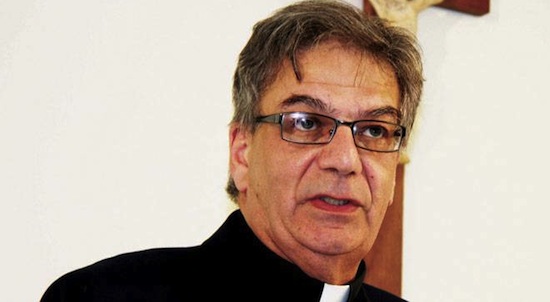01 Apr A process long on shaming and short on evidence

I am increasingly uneasy about the way the Talbot House crisis is playing out. In the space of three weeks this winter, a respected community leader’s life was shattered, and an admired institution that had ministered to troubled individuals for 53 years was abruptly closed—all on the basis of an unspecified third-party complaint of unknown veracity that remains shrouded in secrecy two months later.
[UPDATE: Fr. Paul Abbass has been exonerated. Please see Community Services Dept. vs. Talbot House]
I don’t know Fr. Paul Abbass personally, but I admire the grace and candor he displayed when speaking for the Antigonish Diocese during the crisis that followed Bishop Raymond Lahey’s arrest for possessing child pornography. I’ve only ever heard good things about Talbot House Recovery Centre, the Frenchvale addiction treatment centre Fr. John Webb founded in 1959, and where Abbass served as Executive Director for 17 13 years until his dismissal in February.
The Talbot House board asked Abbass to step down after the Department of Community Services informed it of a complaint against the priest, the nature and source of which it has not publicly revealed. The diocese relieved Abbass of his pastoral duties, and of his role as Vicar General and diocesan spokesperson.
The Cape Breton Regional Police said it had begun investigating was looking into whether information it received about a Talbot House employee it declined to identify “needs a criminal investigation.“ After almost two months seven weeks, it has laid no charges, suggesting that any actual criminality is uncertain.
Although the official bodies involved have been tight-lipped, Dave Mantin, Atlantic Canada group leader of an organization called Survivors Network of those Abused by Priests, told the Chronicle-Herald he had received two complaints about Abbass, one “sexual in nature,” and the other related to “access to medication” and “Abbass’s behaviour.”
Residents of Talbot House are adult men with addictions to alcohol, drugs, or gambling. It is not clear whether Mantin was the source of the complaint to Community Services, but it seems doubtful that the original source was the purported victim, if there was a victim, rather than a third party who disapproved of Abbass’s interactions with someone in treatment.
These events unfolded in the context of two obvious facts:
- The history of sexual scandal in the Catholic priesthood has placed an extra burden of suspicion on any accused priest. By virtue of a category to which they belong, priests are more inclined to be presumed guilty, regardless of evidence.
- Bishop Lahey’s conviction for possessing child pornography deprived the Antigonish Diocese of the moral authority that might have enabled it to serve as a counter-balance to the actions of Community Service in respect of an institution that, though widely respected, does not fit the Community Services Department – Maritime School of Social Work model of care.
I have no inside information, but my experience as a someone who for many years reported on issues involving the Department of Community Services, and my recent experience as a supporter and board member at l’Arche Cape Breton, do not fill me with confidence in the wisdom and fairness of that department when it comes to institutions that operate outside its preferred service delivery model.
Taken altogether, these facts and circumstances set off alarm bells for me. Specifically, I am concerned that:
- A tip of unknown veracity from a self-appointed support group has given Community Services bureaucrats a pretext to shut down an institution they didn’t much like but couldn’t attack head on, with the result that a good organization that has helped hundreds of troubled people no longer functions and likely never will again.
- Father Abbass has been deprived of the presumption of innocence in every practical sense. He may never be charged, let alone convicted. He may be completely innocent of the complaints against him. But in the community’s eyes, he will always carry a stigma of guilt, and his career has been shattered.
- Concerns about privacy have enabled this process to take place entirely in secret.
We used to have a system in which serious accusations were dealt with in open court, according to rules of law that guaranteed accused persons the presumption of innocence and the right to confront their accusers. In the name of privacy, we have replaced that system with one in which an anonymous third party, of unknown motives, can level a complaint whose vague and sinister nature is made public, while all actual evidence is shrouded in secrecy, and the matter is adjudicated by anonymous officials, meeting in secret, with no public accountability.
Obviously it is possible that Fr. Abbass committed acts that are unambiguously wrong and that unquestionably render him unfit to continue with his duties. But how are we to know in the face of a process that is long on shaming and short on evidence?
